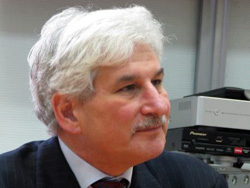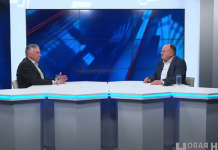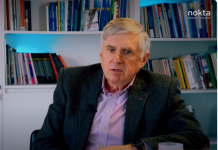What do you think are the characteristic signs of 2010 with regard to Transnistrian conflict settlement?
Philip Remler: In 2010 both sides engaged in serious, pragmatic discussions to solve practical issues that affect the day-to-day life of ordinary people. Several aspects are important in this respect. First, we now have a multi-level network of contacts between Chisinau and Tiraspol: regular meetings of various joint expert groups, regular consultations of the political representatives of both sides and the football diplomacy” between Prime Minister Vlad Filat and Transdniestrian leader Igor Smirnov. Secondly, the sides have reached concrete agreements on some issues și such as reopening the Chisinau -Tiraspol- Odessa railway line and continuing access for farmers from Dorotskaya to their fields in Transdniestrian controlled territory; and they have advanced in finding agreements on other issues, such as re-establishing the fixed-line telephone connection between the sides. Thirdly, a series of five informal 5+2 meetings engaged in constructive discussions on freedom of movement issues and guarantee mechanisms within the settlement process. All these aspects together build a very good base for further progress in 2011.
How would you assess the performance of the Alliance for European Integration in its capacity of a partner to the settlement process, compared to the previous government, that of the Communists?
Philip Remler: We have worked in partnership with all governments since the establishment of the Mission in 1993. In 2010, we had close cooperation with AEI government, which worked hard and successfully to build the confidence needed for meaningful negotiations.
What was the role of the direct communication between Igor Smirnov and Vladimir Filat in the conflict settlement?
Philip Remler: The football diplomacy” meetings between Igor Smirnov and Vlad Filat were an important part of the confidence-building process between the two sides. They played a direct role in some of the solutions found this year to outstanding problems.
Can the Merkel-Medvedev Memorandum contribute to the Transnistrian settlement?
Philip Remler: The high-level attention the Transdniestrian settlement process has received this year in Meseberg, Deauville, Astana and on other occasions is an opportunity which should not be lost. If we can build in 2011 on the progress made with regard to the confidence building process and can preserve high-level attention to this issue on the international level we should be in a position to make real progress in the Transdniestrian settlement process.
Why, in your view, did the last OSCE Summit in Astana fail to adopt clearer documents on Transnistrian conflict settlement?
Philip Remler: The OSCE Summit in Astana had an agenda with many difficult issues, most of them closely interlinked and affecting the discussion on issues such as the Transdniestrian conflict. The Astana Commemorative Declaration touches on these issues, which are important for the Transdniestrian settlement, in a general way.
Is the collaboration of the working groups aimed to build confidence bringing progress to the Transnistrian settlement?
Philip Remler: Building confidence on practical issues is an important aspect of the settlement process and we hope that the work done by these groups will form the basis of a major part of the settlement process.
How, in your view, was the performance of the mediators and observers in the conflict settlement process in 2010?
Philip Remler: We shouldnt be really the ones who assess our work or the work of our partners.
Deputy Minister for Reintegration Victor Osipov said that probably in a few months a formal 5+2 meeting would take place. Do you think the resumption of the negotiations in this format is possible in the near future?
Philip Remler: We are optimistic in this respect, and hope that official negotiations will resume. However, more important than the terminology of the talks are the contents and results. That is what our Mission focuses on.
What is the OSCE stance regarding the cases of Ilie Cazac and Ernest Vardanyan and what are the steps to be taken to ensure human rights observance in the Transnistrian region?
Philip Remler: We have worked on these cases since the beginning. Our work has not been public. Therefore, we have made no public statements or comments. To answer the second part of your question, the Mission has an extensive Human Dimension program with projects that promote the observance of human rights and the rule of law on both sides of the river.
Some surveys and observations show that a majority of citizens in Transnistria plead for reunification of the country. How do you comment on this option?
Philip Remler: I have not seen the surveys you refer to and cant comment on them. Our Missions mandate is to work on a political settlement of the conflict that consolidates the independence and sovereignty of Moldova with an understanding on a special status for Transdniestria. A political settlement implies that both sides agree. I believe this can happen only if the compromises made by both sides produce a settlement that takes into account the interests of the people on both sides of the river and guarantees their rights.
How do you see the final version of the Transnistrian conflict settlement, how and when can it be achieved?
Philip Remler: I have just quoted our mandate above. I think that an agreement along these lines can be found. However, this will require both sides to build up trust in their partners and to make reasonable compromises. This is a process that takes time and continued, persistent effort și primarily from the sides themselves. The international community can support a solution; it cannot and should not impose one.







